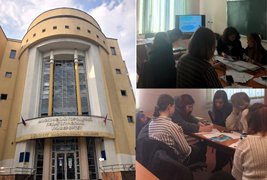Japanese-Language Education in the Vastness of Russia
Moscow City University
KUROIWA Sachiko
Russia’s Japanese-language education started in the 18th century with a proposal by Tsar Peter I (1), and has continued without pause ever since. With this long tradition, how do we support Japanese-language education in Russia, a vast country 45 times the size of Japan (2)? This is an ambitious theme, but here I will introduce part of the work we are carrying out at the moment.
I am responsible for classes at Moscow City University, and I carry out work as the Japanese-Language Chief Advisor for Japanese-language education in Russia.
1)Classes at Moscow City University
Moscow City University started offering Japanese-language education in 2006; in the 2018 academic year, around 150 students are specializing in studying Japanese language here. The influence of pop culture, including anime, is also strong in Russia, and has been the gateway to Japanese-language education for a number of students. Japanese-language education in this university is tending to grow, and many members of the teaching staff are also comparatively young, so I can see new trials taking place. The aspects of Japanese-language education that train interpreters and translators are traditionally strong in Russia, and this university is no exception. I am responsible for part of the second years’ oral expression classes, and when the new academic year began, the students who said that although they had plenty of knowledge, “I’m scared of talking—I want to get my fear of communication under control” was very conspicuous. When I held classes using “Marugoto:Japanese Language and Culture”, I found that there were high levels of satisfaction, based on a survey of the students at the end of the first semester. I gave a presentation at the symposium of the Assotsiatsiia Prepodavatelei Iaponskovo Iazyka Rossii i stran SNG (Association of Japanese Language Teachers in CIS), which was held in March 2019 at this university, and informed the Russian teachers about the class. Recently, I have thought that rather than just being responsible for classes, sharing practical outcomes through academic presentation is also one form of Japanese-language education support.

Moscow City University
2)My Duties as Japanese-Language Chief Advisor
Among all my duties, my main work is as an advisory function. Japanese-Language Specialists (hereinafter “Specialist”) who work as Japanese-language education advisors are also dispatched to the Far Eastern region; I am responsible for areas outside the Far East, and this is a vast region. I am always thinking about how to offer effective support, but truthfully, the work is never-ending.
(1) From Moscow to the Whole of Russia (Online Courses)
Japanese-language education is available in several cities in Russia. I’m repeating myself, but Russia is big, and even if we consider collaborating with a neighboring city to run an event for Japanese-language learners or to hold a seminar for teachers, it’s half a day by train or car to that neighboring city—it's not unusual for people to move by airplane. I’m limited in the travels I can make from here. And so, following on from past Specialists, I have run online courses on Japanese-language teaching methods (a total of 8 sessions), as a way of providing the support I can for the teachers who are dotted around the country, with the same conditions as possible. The course had nine places, but I had 60 applicants, from Kamchatka in the east to St. Petersburg in the west, so I hastily increased the number of classes to cope. There have been spontaneous posts asking for future information exchanges in the participants’ social media group, and I hope that these connections will continue for a long time.
By running online courses, I felt the potential of offering support via the Internet in this vast region.
(2) Heading to Different Parts of Russia (Traveling to Localities)
While the online courses mentioned above are extremely effective, it is also very important that I travel to different educational institutions and actually meet the teachers and listen to them directly. Visits to implement courses and workshops for teachers are the basis of my trips, and I have traveled to eight cities since I took up my post here. Enthusiastic teachers wait for me in each area, which is always humbling.

Students of Astrakhan State University
The other day when I visited Astrakhan, I gave a demonstration class to the students of Astrakhan State University, ran a study session for the teachers who had observed the demonstration class, and also visited two Japanese-language educational institutions within the city. I was able to hear about the case of a learner who traveled three hours one way from a neighboring town to study Japanese, and watch a class in which retired senior citizens enjoyed learning Japanese. I saw parts of Japanese-language education in Russia that I could never learn about in Moscow, and felt a new energy welling up.
I couldn't mention in this report, but I’m aware of the interest of the Russian people in Japan and Japanese—including the Japanese-language learners studying in secondary educational institutions, the courses for children, and the thriving success of events connected to Japan.
Traditional Japanese-language education in places like Moscow and St. Petersburg, Japanese-language education that shines a new light in medium- and small-sized cities, Japanese-language education for young people who will lead the next generation—all of these are Russian Japanese-language education, and in the future I would like to have the opportunity to contact as many Japanese teachers and learners as possible through skillful online use.
*References
1)The Japan Foundation “Information of Japanese-Language Education in each country and region: Russia 2017”
https://www.jpf.go.jp/j/project/japanese/survey/area/country/2017/russia.html
(Accessed May 6, 2019)
2)Ministry of Foreign Affairs “Russian Federation Basic Data”
https://www.mofa.go.jp/mofaj/area/russia/data.html#section1
(Accessed May 6, 2019)
- What We Do Top
- Arts and Cultural Exchange [Culture]
- Japanese-Language Education Overseas [Language]
- Japanese-Language Education Overseas [Language] Top
- Learn Japanese-language
- Teach Japanese-language
- Take Japanese-Language Test
- Know about Japanese-language education abroad
- The Japanese-Language Institute, Urawa
- The Japanese-Language Institute, Kansai
- Japanese-Language Programs for Foreign Specified Skilled Worker Candidates
- Japanese Language Education for Japanese Children Resident Overseas and for the Descendants of Migrants
- Archives
- Japanese Studies and Global Partnerships [Dialogue]
- JF digital collection
- Other Programs / Programs to Commemorate Exchange Year
- Awards and Prizes
- Publications
